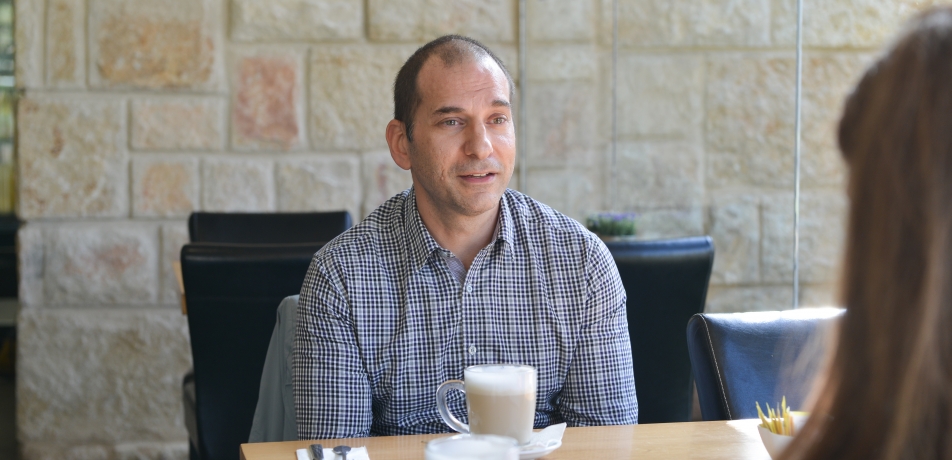Dr. Stavros Bashiardes
On genes and diplomacy
People behind the science

Dr. Stavros Bashiardes doesn’t fit the typical profile of a visiting scientist.
He is a geneticist specializing in the effects of HIV infections on the gut microbiome of patients, conducting research in the laboratory of Dr. Eran Elinav of the Department of Immunology, while living in the ambassadorial residence of Cyprus in Herzliya with his wife, Thessalia Salina Shambos, the new Cypriot Ambassador to Israel, and their two young children.
Dr. Bashiardes was born in Zambia to a Greek mother and Cypriot father. His family moved to Cyprus when he was six and he spent the rest of his childhood living on the sunny Mediterranean island. His academic studies took him to the UK where he studied genetics and received his PhD, and then he moved to the U.S. to work at the lab of the renowned Prof. Michael Lovett in the Division of Human Genetics at Washington University School of Medicine in St. Louis. He spent five years there implementing genomics approaches to study sensorineural deafness (a specific type of hearing loss), implementing various approaches to identify diseasecausing genes, and developing methods to study the human genome.
After returning home to Cyprus, Dr. Bashiardes continued his scientific career at the Cyprus Institute of Neurology and Genetics in Nicosia, Cyprus’s leading scientific research center. There, he investigated gene therapy approaches to neuromuscular disorders using viral gene delivery systems, implementing genome analysis methods to identify causative variations in rare diseases, and investigating clinical aspects of HIV pathogenesis.
He also married his wife, the daughter of a diplomat who served as Cyprus’ permanent representative to the UN.
Amb. Shambos, who had completed four years of medical school before she decided to change her path and pursue a career in international relations and diplomacy, has long been an advocate for Israel. Following several postings, including in Athens and Rome, and gradually climbing up the diplomacy ladder, she was offered the position as Ambassador to Israel.
At home in Israel
Cyprus is only a 38-minute flight away, but the family sticks around Israel on weekends and has begun to feel very connected to the country, says Dr. Bashiardes. As a geneticist, he hoped that his wife’s assignment to Israel would open doors for his career too. He immediately reached out to Dr. Elinav, whose work he greatly admired, and was thrilled to secure a visiting scientist position.
In Dr. Elinav’s lab, Dr. Bashiardes is studying the effects of viral infections on the gut microbiome and their consequences. He is implementing new techniques to study compositional changes in gut microbiota and genes expressed by the bacterial community, and the effects on patients. He is part of a team carrying out the HIV project that began upon his arrival in collaboration with the AIDS Center of the Hadassah Medical Center in Jerusalem led by Dr. Elinav.
“I could not be in a more ideal situation,” says Dr. Bashiardes. “Dr. Elinav is an incredible scientist and person, with an amazing publication record. His leadership is inspiring in the way he has handpicked his team of scientifically unique individuals, how he guides and motivates the team, and how he achieves a sense of community in the lab.”
Dr. Bashiardes says his family is very happy in Israel and feels a sense of “home away from home,” drawing similarities between the climate, culture, and food in Cyprus.
In addition to the scientific research and official ambassadorial duties, he and his family are involved in supporting the many Cypriot families who come to Israel for emergency medical care, helping them to navigate the bureaucracy and alleviating the daily burden of maintaining a sense of balance while caring for sick family members.








